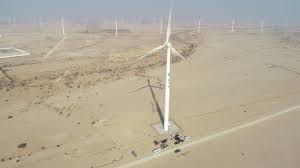Pakistan’s determination to develop renewable energy far sighted: Chinese Scholar

China Economic Net
Beijing: Pakistan’s determination to develop renewable energy and decision to produce 60 percent of clean energy by 2030 is not only a far sighted policy but it would bring huge economic benefits, Chinese scholar Cheng Xizhong said on Wednesday.

Increasing the proportion of clean energy can not only reduce greenhouse gas emission, but also save a lot of foreign exchange, reduce electricity prices, attract more foreign investment and bring huge economic benefits,Cheng, visiting professor at Southwest University of Political Science and Law and senior fellow of Charhar Institute said in his article published by China Economic Net (CEN).
While delivering a speech at the Climate Ambition Summit organized by the United Nations via video link, Prime Minister Imran Khan told the world leaders that Pakistan has decided to have nature-based solutions to mitigate impacts of climate change by planting 10 billion trees across the country in the next three years.

Prime Minister Imran Khan also informed the world leaders that Pakistan had also decided that by 2030, 60% of energy produced in Pakistan would be clean energy through renewable means.
Cheng observed that Pakistan is rich in coal resources, but thermal power will produce a lot of pollution. Now Pakistan has decided not to have any more power based on coal burning.

Pakistan has already scrapped two coal power projects, which are supposed to produce 2,600 megawatts of energy. Pakistan has decided to produce energy either by coal to liquid or coal to gas. This is a very wise decision of Imran Khan’s government.
At present, hydropower accounts for 32 percent of the gross power generation in Pakistan. On the issue of hydropower, here are two problems.
First, the power load in Pakistan is mainly concentrated in the central and southern regions, where many large and medium-sized cities are distributed, but water resources are mainly distributed in the eastern part of the country, and hydropower needs to be transmitted to the central and southern regions in a long distance.
Apart from hydropower and nuclear power, Pakistan’s renewable energy generation accounts for less than 1% of the total power generation.
Nuclear power, hydropower and new renewable energy are all conducive to environmental protection.
At this initial stage, the Pakistani government and people attach great importance to the development of renewable energy and environmental protection, which is worthy of high appraisal by the international community, he said.
China has two advantages in the field of renewable energy. One is that the technology is leading in the world.
The other is that there is no problem with the capital for foreign investment. Many Chinese enterprises are looking for cooperative partners around the world. Now, hydropower is the largest environment-friendly energy in the world.
By the end of 2019, Chinese enterprises had participated in 406 international hydropower cooperation projects with an installed capacity of 127 million kilowatts.
The construction mode is mainly on contract terms, accounting for nearly 70% of the total number of international cooperation projects.
He said, in terms of wind power and photovoltaic power generation, China’s technology and cumulative installed capacity rank first in the world.
China has technology and capital, and Pakistan needs to develop renewable energy. Therefore, there is a great potential for cooperation between China and Pakistan in the field of renewable energy.





